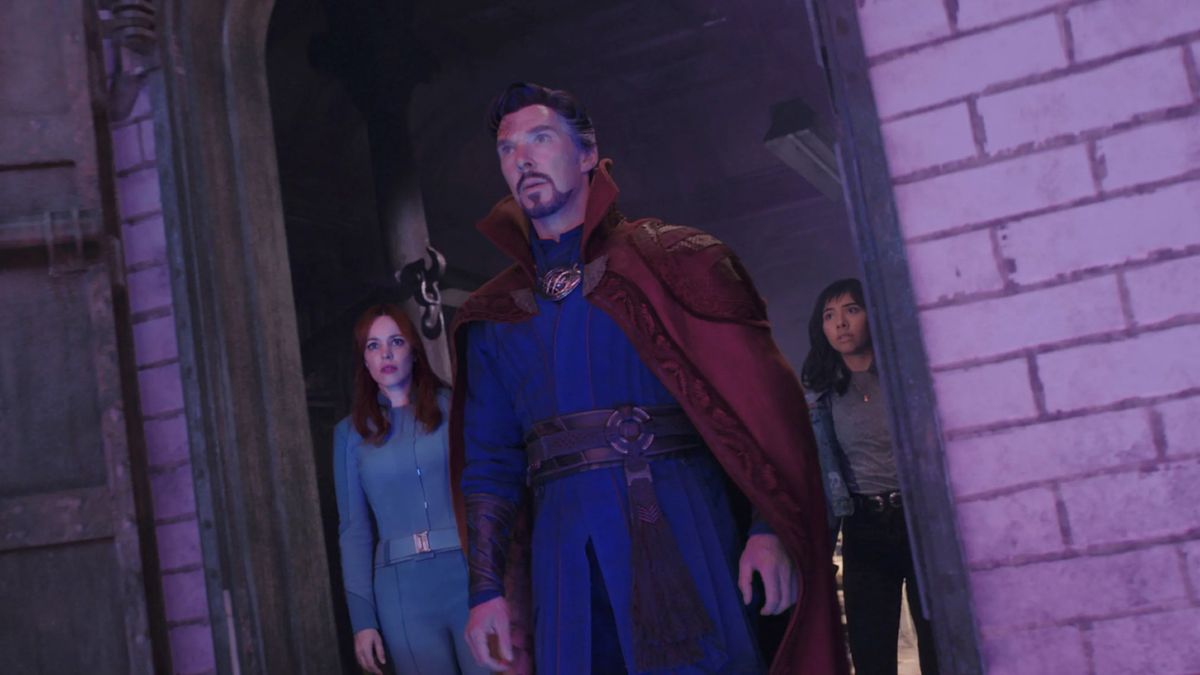How the multiverse works in the Marvel movies
Let's unravel the multiverse

Doctor Strange 2 goes all-in on the multiverse – exactly what you'd expect from a movie titled Doctor Strange and the Multiverse of Madness. But how does it all work?
We've already had a taste of the multiverse in Loki and Spider-Man: No Way Home – Loki saw the titular trickster come face to face with several variants (i.e. people that diverge from a selected 'main' timeline and create another timeline with different events and history), while No Way Home saw Tom Holland's Peter Parker come face to face with Tobey Maguire and Andrew Garfield's versions of the character after a spell cast by Doctor Strange went wrong.
So, let's get into it and answer some of those questions. Buckle up, we're heading into the multiverse. Spoilers for Doctor Strange and the Multiverse of Madness lie ahead, too.
How does the multiverse work in the Marvel movies?
The multiverse is a collection of alternate universes. 'Our' universe, or the universe where the majority of MCU movies and shows take place, is called Earth-616 – each universe has a designated number to tell them apart. As well as taking place on Earth-616, a significant portion of Doctor Strange 2 is also spent on Earth-838. And if you're wondering why 616 in Doctor Strange 2 got cheers in the cinema, it's because the number has a comic book past.
As for how Doctor Strange is able to travel between universes in the sequel, that's thanks to the powers of America Chavez. America has the ability to open portals to other universes, but she struggles to control her power and use it on command.
Universe-hopping comes at a price, though – when two universes collide, an incursion occurs. This results in both universes being destroyed and the multiverse contracting. According to comic book lore, each time a new incursion happens, the time it takes for an incursion to happen shortens. On Earth-838, Strange was executed for causing an incursion and, in the Doctor Strange 2 post-credits scene, it's revealed that the Strange from Earth-616 has also caused one, due to Strange taking over a dead body.
How does dreamwalking work in the Marvel movies?

Dreamwalking is when a person inhabits an alternate version of themselves in another universe – both Wanda and Doctor Strange do this.
Sign up for the Total Film Newsletter
Bringing all the latest movie news, features, and reviews to your inbox
Wanda dreamwalks in alternate universes where her sons, Billy and Tommy, are alive – they ceased to exist at the end of WandaVision when Wanda's fabricated town of Westview was destroyed and she's desperate to be reunited with them, whatever the cost.
Meanwhile, Doctor Strange dreamwalks while he's stuck in the netherworld reality in order to fight Wanda and save America Chavez on Earth-616. The only version of Strange that exists on Earth-616, however, is the corpse of yet another version of Strange, so the sorcerer must inhabit the dead body. However, reanimating the dead comes at a price, and he's attacked by spirits.
Why haven't we seen the multiverse before Phase 4?

We have, of course, seen the multiverse a few times now, but the real breaking point came during the Loki finale. Essentially, the main Marvel timeline had been kept in one piece by a man known as He Who Remains. This timeline was known as the Sacred Timeline, and anyone who deviated from it was killed by a group known as the Time Variance Authority – or TVA.
Loki and a female variant of him, Sylvie, travel to the end of time and kill He Who Remains, resulting in the timeline fracturing. Without the man behind the TVA keeping everyone from obeying the events of the Sacred Timeline, the multiverse broke. That's why, after the Loki finale, we've been seeing multiple Spider-Men, Wandas, and Stranges. The Sacred Timeline has been broken, and now it's all to play for in the MCU.
Want more on Doctor Strange in the Multiverse of Madness? Then check out our guides to:
- Doctor Strange 2 ending explained
- The Illuminati in Doctor Strange 2, listed and explained
- Our guide to Marvel Phase 4
- The rumored Doctor Strange cameos that never came true
- When is Doctor Strange 2 on Disney Plus?
- All the Doctor Strange 2 Easter eggs listed
- Where Doctor Strange 2 fits on the Marvel timeline
- Who is Hayley Atwell in Doctor Strange 2?
- Who plays Captain Marvel in Doctor Strange 2?
- Who is Charlize Theron in Doctor Strange 2?
- Who is John Krasinski in Doctor Strange 2?
- Who is Black Bolt in Doctor Strange 2?
- The TV history of the Darkhold, explained
- Patrick Stewart is Professor X – but not the one you think
- Our full WandaVision recap
- The Marvel movies and shows to watch before Doctor Strange 2
- How to watch the Marvel movies in order
- Is Doctor Strange 2 too scary for children?
I’m an Entertainment Writer here at GamesRadar+, covering everything film and TV-related across the Total Film and SFX sections. I help bring you all the latest news and also the occasional feature too. I’ve previously written for publications like HuffPost and i-D after getting my NCTJ Diploma in Multimedia Journalism.
Most Popular

